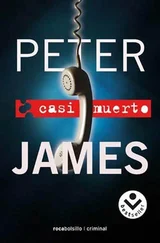Peter James - Perfect People
Здесь есть возможность читать онлайн «Peter James - Perfect People» весь текст электронной книги совершенно бесплатно (целиком полную версию без сокращений). В некоторых случаях можно слушать аудио, скачать через торрент в формате fb2 и присутствует краткое содержание. Жанр: Триллер, на английском языке. Описание произведения, (предисловие) а так же отзывы посетителей доступны на портале библиотеки ЛибКат.
- Название:Perfect People
- Автор:
- Жанр:
- Год:неизвестен
- ISBN:нет данных
- Рейтинг книги:4 / 5. Голосов: 1
-
Избранное:Добавить в избранное
- Отзывы:
-
Ваша оценка:
- 80
- 1
- 2
- 3
- 4
- 5
Perfect People: краткое содержание, описание и аннотация
Предлагаем к чтению аннотацию, описание, краткое содержание или предисловие (зависит от того, что написал сам автор книги «Perfect People»). Если вы не нашли необходимую информацию о книге — напишите в комментариях, мы постараемся отыскать её.
Perfect People — читать онлайн бесплатно полную книгу (весь текст) целиком
Ниже представлен текст книги, разбитый по страницам. Система сохранения места последней прочитанной страницы, позволяет с удобством читать онлайн бесплатно книгу «Perfect People», без необходимости каждый раз заново искать на чём Вы остановились. Поставьте закладку, и сможете в любой момент перейти на страницу, на которой закончили чтение.
Интервал:
Закладка:
The geneticist jumped to his feet, walked over, took her hand gently. ‘Naomi, you must have been to hell and back losing Halley. Now you are going through another incredibly difficult time. These four weeks on this ship are going to be physically tough for you as well as mentally tough. It’s very important you always say what you feel, and for you to recognize if you reach the point where you’ve changed your mind and want out. We have to be honest with each other, OK?’
‘Thank you,’ she said.
He released her hand but continued to hold her gaze. ‘The world is changing, Naomi, that’s why you and John are here. Because you are smart enough to realize that.’
There was a long silence. Naomi looked through the window at the vast expanse of flat blue water and at the container ship still visible on the horizon. She looked at her husband, then at the geneticist, then down at the form, thinking about Halley, remembering why they were here.
Dreyens-Schlemmer disease affects the body’s immune system in a similar but far more aggressive way than lupus. It progressively induces a sustained innate immune response. It was as if it turned Halley’s own first line of defence into a corrosive acid, literally eating away his own internal organs. He had died, after screaming non-stop for two days for the pain to cease, no drug able to help him, haemorrhaging blood through his mouth, nose, ears and rectum.
Dreyens-Schlemmer disease was identified in 1978 by two scientists at Heidelberg University in Germany. Because it was so rare, affecting fewer than one hundred children in the world at any one time, their discovery was of largely academic value only. Pharmaceutical companies are not interested because the costs of their research could never be recouped. The only way to defeat Dreyens-Schlemmer disease would be through a long, slow process of eliminating it by breeding it out of the human species.
Most people who carried the relatively rare gene for it had perfectly healthy children without any problem at all. It was only in the extreme circumstance when two unwitting carriers of the recessive gene produced a baby together that the problem could arise.
Neither John nor Naomi had any previous family history of Dreyens-Schlemmer – so far as they knew. But after Halley’s birth – and by then too late – they had discovered they were both carriers of the gene. Which meant there was a one in four chance any child they had would be affected.
Naomi looked at Dettore again. ‘You’re wrong,’ she said. ‘The world might be changing, but I’m not smart enough to understand how. Maybe I don’t even want to understand. It scares me.’
8
In the deserted gymnasium, John’s shoes pounded on the treadmill of the running machine; it was ten to seven in the morning. Perspiration guttered down his face and down his body; beads of water streaked his glasses, making it hard to read the television monitor that was tuned to CNN business news and displaying lists of the previous day’s closing NASDAQ prices.
From as far back into childhood as John could remember, he had been driven by a hunger for knowledge. He loved collecting tadpoles in the spring, watching them sprout legs, lose their tails, change into tiny frogs. He badgered his mother each school holiday to drive him from their home town of Orebro, in central Sweden, to Stockholm, to the Natural History Museum and the National Museum of Science and Technology. When he was eighteen he’d gone to London to a summer school to improve his English, and had spent almost the entire three months inside the Science, Natural History and British Museums.
John particularly admired the great scientists of past eras. People like Archimedes, Copernicus, Galileo, Newton, Pasteur, whose work, he considered, had shaped our modern world. And just as much, he admired the big men of physics and mathematics of the twentieth century, such as Einstein, Fermi, Oppenheimer, von Neumann, Feynman, Schrodinger, Turing, whose work, he believed, would shape our futures. All of them were people who had taken huge risks with their time and their reputations.
If John had been asked what his ambition was, he would have answered that he had no interest in becoming rich, but he would love to have his own name up there, one day, among the big men of science. Once, when he was ten, a few weeks after his father, a dreamer and failed businessman, had died in debt, he wrote down a list of what he wanted to achieve in life:
(a) To be a respected scientist.
(b) To leave the world a better place than when I was born.
(c) To extend human lifespan.
(d) To take care of Mamma.
(e) To stop pain in the world.
(f) To be a good father.
Whenever John felt low, he looked at the list. At some time during his teens he had transferred it from his little red notebook onto his computer, and subsequently from computer to computer. Reading it always made him smile; but it made him sad, too.
I’m thirty-six and haven’t yet achieved one damned thing on that list.
He felt particularly bad about his neglect of his mother. As an only child he felt very responsible for her. She’d married again when he was eighteen, shortly before he’d gone to Uppsala University, to a widower, a schools inspector who had visited the hogsta-diet – senior school – where she taught mathematics. A quiet but decent man, he was the opposite of John’s own father in just about every way. Five years later he died of a heart attack, and his mother had been on her own ever since, fiercely independent, despite the fact that she was losing her eyesight through macular degeneration.
As a child, John had been an avid science-fiction reader, his head full of theories and questions. Theories about why we existed, about how certain animals and insects had acquired their characteristics. Questions about why some creatures, like the common ant and the cockroach, had seemingly ceased evolving a million years ago – yet others, such as human beings, continued. Why had some animal brains stopped growing hundreds of thousands of years ago? Was it because having too smart a brain was a hindrance to survival rather than an asset? Would humans eventually destroy themselves precisely because evolution was making them too smart for their own good?
Or, as he explored in his work, did humans risk destroying themselves because they were developing technology at a faster pace than their brains were developing? And were they in need of a major evolutionary leap forward to catch up?
The ship lurched suddenly, unbalancing him, and he had to grab the handrail to stop himself falling sideways off the treadmill belt. Through the open door he could hear the water in the plunge pool sloshing. He hadn’t felt as sick as Naomi had, but he still wasn’t totally acclimatized yet to the motion.
Neither he nor Naomi had slept much again last night. The same questions were going through his mind now that they had discussed over and over. Yes, they both agreed that they wanted to give their son all the advantages they would have liked their own parents to have given them. But they didn’t want him being too different and finding himself unable to relate or connect to people.
And that was the real problem. Dettore was pushing them all the time to go for more options, to enhance their son in ways that even John hadn’t realized were already scientifically possible. And some of these options were tempting. My God, if they wanted, they could really make Luke into an incredible person!
But no thanks.
Luke wasn’t going to be some kind of laboratory rat that they could just terminate humanely with a needle if he came out different to how they were expecting.
He did not want to gamble with his son’s life. And yet what haunted him during the night was the knowledge that any child was just that, a gamble, a random throw of the genetic dice. What Dettore was offering was a way to reduce the odds, not increase them. In playing safe, would they be condemning their son to a life of mediocrity?
Читать дальшеИнтервал:
Закладка:
Похожие книги на «Perfect People»
Представляем Вашему вниманию похожие книги на «Perfect People» списком для выбора. Мы отобрали схожую по названию и смыслу литературу в надежде предоставить читателям больше вариантов отыскать новые, интересные, ещё непрочитанные произведения.
Обсуждение, отзывы о книге «Perfect People» и просто собственные мнения читателей. Оставьте ваши комментарии, напишите, что Вы думаете о произведении, его смысле или главных героях. Укажите что конкретно понравилось, а что нет, и почему Вы так считаете.











